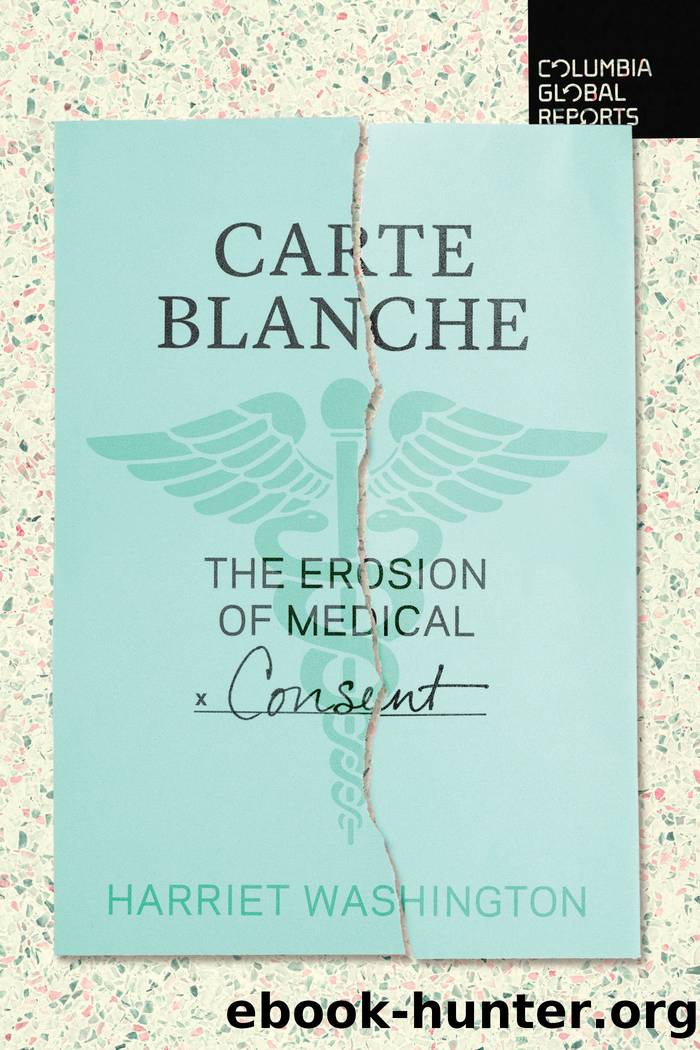Carte Blanche by Harriet A. Washington

Author:Harriet A. Washington
Language: eng
Format: epub
Publisher: Columbia Global Reports
Published: 2021-06-14T16:00:00+00:00
The Triad of Death
Hypothermia is part of what doctors call âthe triad of deathâ (falling blood-plasma pH and bloodâs inability to coagulate constitute the other deadly events). These events make a patientâs resuscitation increasingly unlikely.
Like other deadly crises, hypothermia triggers the grim, controlled urgency of the emergency department as each team member slides into their role, uttering terse updates as the energetic rewarming, treating, and close monitoring of the patient, who faces a lingering threat of cardiac arrest until the crisis is resolved, takes effect, for good or ill.
In 2010, a study was published where Baltimore researchers, instead of treating victimsâ wounds with the standard of care, intentionally induced hypothermia in unwitting Black men who had suffered gunshot wounds. The researchers, led by Samuel Tisherman at the University of Marylandâs R. Adams Cowley Shock Trauma Center, said they sought to discover whether the typically-fatal cold might help these men to survive their injuries. The studyâs formal name is Body Cooling Study: Emergency Preservation and Resuscitation for Cardiac Arrest from Trauma, or EPR-CAT.
Tishermanâs team acknowledged that hypothermia is frequently fatal, but rationalized their acts by noting that a very small number of people, notably some infants, have survived drowning in cold water, although often with lingering health problems. Researchers wondered whether the slowed metabolism caused by hypothermia might be a protective factor.
The researchers were testing this in adults without asking their consent because, they explained, the subjects would be unconscious and unable to give it, and it meets the federal conditions for nonconsensual research under 21 CFR 50.23-4. However, thereâs no mention of how meeting the required conditions would be individually assessed, nor what provisions for consent would be made if a victim became conscious, as Martha Milete did during her PolyHeme infusion.
Why target Black men? A 2016 article in the New Yorker vaguely implies that it is because they suffer high rates of firearms deaths:
Baltimore has one of the nationâs highest rates of gun violence, and Shock Trauma admits at least two or three shooting victims each weekâoften, like Brandon Littlejohn, young Black men.
If Black men were the most frequent victims of death by gunfire and therefore gunfire posed a uniquly high risk to them, the Baltimore researchers might be able to construct a case that singling them out as subjects constitutes an equitable distribution of research risks and benefits. However, the U.S. leads the world in gun deaths, and most of these deaths are in white men: nine thousand white men died from firearms in 2012, compared to six thousand Black men. Moreover, in Baltimore in 2016, unarmed Black Americans were five times as likely as unarmed white Americans to be shot and killed by a police officer. Targeting of this marginalized racial minority is both unethical and illogical.
Being the most frequent victims of gunshot wounds is not an acceptable reason for subjecting a population to dangerous and involuntary experimental hypothermia, but if it were, that population would be white men.
Moreover, Black men suffer higher-than-normal rates from almost every form of heart disease, including congestive heart failure and heart attacks.
Download
This site does not store any files on its server. We only index and link to content provided by other sites. Please contact the content providers to delete copyright contents if any and email us, we'll remove relevant links or contents immediately.
Melania and Me by Stephanie Winston Wolkoff(1058)
Orlando by Virginia Woolf; Mark Hussey(1035)
The Class of 83 by Hussain Zaidi(1001)
Live in Love by Lauren Akins & Mark Dagostino(976)
Dancing in the Mosque by Homeira Qaderi(964)
A History of My Brief Body by Billy-Ray Belcourt(909)
Virginia Woolf by Between The Acts(790)
Just as I Am by Cicely Tyson(758)
The Common Reader, Book 1 by Virginia Woolf(756)
Stranger Care by Sarah Sentilles(751)
Robespierre: A Revolutionary Life by Peter McPhee(747)
The Schoolgirl Strangler by Katherine Kovacic(745)
1914 by Luciano Canfora(733)
Ariel (english and spanish Text) by Sylvia Plath(728)
Unforgetting by Roberto Lovato(727)
Harriet Tubman: The Biography by University Press(716)
Broken Horses by Brandi Carlile(716)
Paris Without Her: A Memoir by Gregory Curtis(711)
Berlin Diary: The Journal of a Foreign Correspondent 1934-41 by William L. Shirer & Gordon A. Craig(709)
